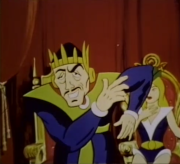|
Tweezer Reprise posted:I would say it's fundamental in itself, as it's the diatonic tritone, the tritone that creates the intense direction of the V7 chord back towards the tonic! mm you have perfectly characterized my perspective on harmonic color. i agree with that description, that i think of the P4 and M7 in the major scale as color notes, and the other 5 tones as "even more color notes" But if you're trying to tell me that the tritone is a fundamental interval? When in fact, it's WAY the gently caress down in the harmonic series (harmonic number 11) -- in a direction that points away from "fundamental"! haha just kidding (i'm doing a bit where I think there's one and only one definition of each word.) If it's "fundamental" to anything, I would say that the tritone is fundamental to "tonal music" (if, indeed, that is its real name).
|
|
|
|

|
| # ? Jun 7, 2024 21:34 |
|
Yeah! Of course, I meant the music theory of Western common practice, which is, of course, culturally contingent.
|
|
|
|
landgrabber posted:don’t call it a b2 you’re gonna gently caress him up im allowed to call it a b2 when im talking about scale degrees. as you know, its customary to say b9 when talking about chord tones
|
|
|
|
Helianthus Annuus posted:im allowed to call it a b2 when im talking about scale degrees. as you know, its customary to say b9 when talking about chord tones oh sorry i didn't read the post and i thought you were calling a minor 2nd a flat 2nd
|
|
|
|
i have no opinion on this other than that i love the major 7th and the perfect 4th and i use them alllll the time when i write, so removing them from scales feels like "some bitch poo poo to do"
|
|
|
|
sus4 is my favorite chord, I think. I default to it a lot 
|
|
|
|
landgrabber posted:i have no opinion on this other than that i love the major 7th and the perfect 4th and i use them alllll the time when i write, so removing them from scales feels like "some bitch poo poo to do" you'll regret disrespecting the pentatonic like this!  trying to curry favor with your new friends in the Piano thread, or something? wait until the Guitar thread hears of this betrayal!
|
|
|
|
Pollyanna posted:sus4 is my favorite chord, I think. I default to it a lot i think you just love quartal harmony! i do too. heres some Beatos about it, if you have the attention span for them: https://www.youtube.com/watch?v=DlML3adH9yQ https://www.youtube.com/watch?v=dRQBvZfn3Vo EDIT: in this video, he keeps saying "FQ" (stands for a "quartal" chord, with notes F Bb Eb -- separated by perfect 4ths). but saying it out loud, it sounds like a TV edit of a movie where someone says "f--k you" lol Helianthus Annuus fucked around with this message at 20:14 on Nov 27, 2021 |
|
|
|
landgrabber posted:anyway i got to the bottom of why the “music theory is descriptive not prescriptive” crowd bugs me so much: this is a strawman person you're making up to be mad at, or at least not someone who posts on these dead gay forums. nobody who actually knows theory says "just do w/e lol" unless they're shitposting, are albert ayler, or are trying to help someone who feels stifled by conventional resolutions/ isn't into the sound of functional harmony and resists learning theory concepts based on that. what we generally refer to in a vacuum as music theory is descriptive because it's descriptive language, it helps you evaluate the consonance or dissonance of a note or set of notes relative to others preceding or succeeding it. the stylistic norms of western pop/rock/w/e music owe just as much to non-western traditions as they do to any of the canonical prescriptive parts of western music theory. most prescriptive western music theory is rules for orchestration more than anything else, avoiding parallel fifth mud in big ensembles.
|
|
|
|
Helianthus Annuus posted:you'll regret disrespecting the pentatonic like this! the guitar thread would not be surprised at this point. also i alraedy said 4 and 7 were the most thrilling degrees to me months ago and someone got really mad for some reason and insulted me lol i'm not good enough to hang with the piano people, it's less that they're my friends and more like a small group of people i kinda stand near sometimes, like when i'd try to make friends with the art kids in sophomore year creamcorn posted:this is a strawman person you're making up to be mad at, or at least not someone who posts on these dead gay forums. nobody who actually knows theory says "just do w/e lol" unless they're shitposting, are albert ayler, or are trying to help someone who feels stifled by conventional resolutions/ isn't into the sound of functional harmony and resists learning theory concepts based on that. i actually am getting mad at a specific post i found when i googled something along the lines of "how do i resolve a ___" chord, and i found a paragraphs long post saying exactly what i was describing. was it one instance? yeah. i feel like i've run into something similar before, but either way, it was someone self-sucking and it actually impeded me when i was trying to learn things i could use to actually compose
|
|
|
|
Pollyanna posted:sus4 is my favorite chord, I think. I default to it a lot it's nice to suspend a V7 chord to soften it a bit sometimes!
|
|
|
|
i guess i was the one who said it was descriptive recently. i just mean that it describes music without judgement, it's up to you to decide if traditional harmony sounds good to you or if you want to branch out. but yes, it also tells you what are the "standard sounds" and that stuff is standard for good reason
|
|
|
|
Helianthus Annuus posted:i think you just love quartal harmony! i do too. yoooooooo hell yeah this is super cool tytyty EDIT: Ahahaha, something about this was familiar, and sure enough, check out the upwards motion here: https://www.youtube.com/watch?v=GOy_AQrSw6U&t=24s Stacked fourths, D G C F A#. Good poo poo, my dude. a.p. dent posted:i guess i was the one who said it was descriptive recently. i just mean that it describes music without judgement, it's up to you to decide if traditional harmony sounds good to you or if you want to branch out. but yes, it also tells you what are the "standard sounds" and that stuff is standard for good reason Lol nah I've said that recently too. IMO I think we're conflating "music theory is derived from what we hear and perceive, it's not the source of truth for how to make good music" with "music doesn't have any rules whatsoever and you can do what you want cause it doesn't really matter". It clearly does matter, cause it has structure and exhibits patterning - it's just that it's not as simple as writing a bunch of steps down like an 8th grade math formula and following them. Or at least, those steps and identifications don't explain everything. There's no GUT. Pollyanna fucked around with this message at 16:21 on Nov 30, 2021 |
|
|
|
Pollyanna posted:yoooooooo hell yeah this is super cool tytyty i've never read any theory related text that actually instructs you on how to write music -- only guidelines to help keep poo poo sounding good. an example is that i was wondering why something wasn't working the other day, while writing a part in sibelius. i was trying to do two piano melodies at the same time. i got to a certain note and wondered "wait why does that just disappear" and it turns out i'd inadvertantly made a consonant interval between two lines at the same time, and the lines were moving in the same note duration at the same time, so the melodies would sound good and then hit that point and disappear. i kind of look at rules less like "i need to keep these things in mind while writing" and more like "if poo poo goes wrong, here's a list of things that might actually be the issue there" and that's a very helpful thing to me -- that way i don't get sucked into solving the problem for so long that i either get frustrated, or lose being tuned into the emotional center that led me to write music in the first place. maybe other theory texts are just a really big dick to the reader, but i've mainly been immersed in harmony and voice leading, which has been pretty good, from what i've seen, about identifying conditions where it's okay to break the "rule" -- most often saying "...except to create melodic interest" which is pretty much right on.
|
|
|
|
if only i had the discipline to keep working on ear training in the past. i'm now at the point where i can identify intervals harmonic, ascending, and descending about 90% of the time. more than that, though, is the confidence that comes from having them worked out in my head. i've been practicing melodic dictation mentally, just from songs i hear, and it's getting really fast. for those who have really developed their ear: did you ever get to the point where interval recognition became truly automatic and unconscious? as in, you hear a melody and could instantly transcribe it without repeating it back in your head. i assume this must be possible, but not sure if it's possible for somebody starting at my age to get there.
|
|
|
|
gonna brag about my ear training results this is for all intervals (within an octave, no compound intervals yet) played harmonically. i only started practicing in earnest last week, when i probably would have gotten 20% on this, so it's definitely possible to improve!
|
|
|
|
a.p. dent posted:if only i had the discipline to keep working on ear training in the past. i'm now at the point where i can identify intervals harmonic, ascending, and descending about 90% of the time. more than that, though, is the confidence that comes from having them worked out in my head. i've been practicing melodic dictation mentally, just from songs i hear, and it's getting really fast. i haven't gotten there. but i have a good ear some specific intervals. like the leading tone, the flat-2, the perfect 5th and perfect 4th.
|
|
|
|
gotcha. yeah, it's probably too much to expect to automatically hear intervals in melodies i'm noticing, when trying to identify triad inversions, that my ear is really sneaky. if a chord is in 1st or 2nd inversion, i will still "hear" the root note on the bottom even if it's not present (especially with close-voiced triads). it's hard to correctly sing the notes i hear because i'll just grasp at any chord tone nearby. still, it's getting easier - i can identify major triad inversions correctly maybe 80% of the time.
|
|
|
|
I found this tuner. It's a harmonica reed in a little metal cylinder and it only says 528 on it. So I googled that and it seems to be some kind of new age woo woo poo poo about the frequency of love. Also something about 440 Hz being the international standard. I just wanna know what note it plays, it feels like a C or D but I would bet 0$ on that assumption. This is the right thread for this yeah?
|
|
|
|
DiHK posted:I found this tuner. It's a harmonica reed in a little metal cylinder and it only says 528 on it. So I googled that and it seems to be some kind of new age woo woo poo poo about the frequency of love. Also something about 440 Hz being the international standard. I just wanna know what note it plays, it feels like a C or D but I would bet 0$ on that assumption. I might be wrong, but 440hz is the standard tuning for A so you may be looking at a C in a tuning that uses an alternate freq for A, such as A = 444hz, which many feel is more "natural" or "healing" or whatever bullshit. Not really my wheehlouse but that may be it.
|
|
|
|
I knew it was going to happen sooner than later but Barry Harris died last night. I posted in here because I know there are a lot of fans. I always wanted to attend one of his classes, but fortunately there are a lot of people who are carrying the torch for him these days. Just an OG and an amazing teacher. His methods help make jazz a lot more sense for me.
|
|
|
|
zenguitarman posted:I knew it was going to happen sooner than later but Barry Harris died last night. I posted in here because I know there are a lot of fans. I always wanted to attend one of his classes, but fortunately there are a lot of people who are carrying the torch for him these days. Just an OG and an amazing teacher. His methods help make jazz a lot more sense for me. thanks for letting us know. i'm grateful he shared with us his way of thinking about music.
|
|
|
|
DiHK posted:I found this tuner. It's a harmonica reed in a little metal cylinder and it only says 528 on it. So I googled that and it seems to be some kind of new age woo woo poo poo about the frequency of love. Also something about 440 Hz being the international standard. I just wanna know what note it plays, it feels like a C or D but I would bet 0$ on that assumption. oh yes. Brawnfire posted:I might be wrong, but 440hz is the standard tuning for A so you may be looking at a C in a tuning that uses an alternate freq for A, such as A = 444hz, which many feel is more "natural" or "healing" or whatever bullshit. Not really my wheehlouse but that may be it. I think 528 Hz is the the just-intonated minor 3rd in the key of A minor, where A is tuned to 440 Hz (the standard tuning today). 528 Hz makes a 6:5 ratio with 440 Hz. >>> 528 / 440.0 1.2 >>> 6 / 5.0 1.2 https://en.wikipedia.org/wiki/Minor_third https://en.wikipedia.org/wiki/Just_intonation https://en.wikipedia.org/wiki/Equal_temperament So, you could call it a C! (In the key of A minor, tuned in just intonation.) In equal temperament with A=440, you get 523.25 Hz for C. I think that little harmonica tuner might be for vocalists who want to sing in just intonation. Barbershop quartet, for example. Helianthus Annuus fucked around with this message at 16:25 on Dec 9, 2021 |
|
|
|
wow, that's big news. barry was an absolute giant of jazz pedagogy. guess i know what i'm going to be watching today
|
|
|
|
I love Barbershop! And thanks for the technical explanation, this poo poo is cool
|
|
|
|
regarding woo woo nonsense about specific frequencies being healthier: I think this is a misunderstanding of just intonation vs equal temperament. Hearing a specific frequency on its own won't do anything special for you. However, hearing two specific frequencies will have an effect on you, because your ears will immediately try to compute the ratio of those frequencies. Going back to the minor 3rd interval. If it's a simple ratio, like the 6:5 we get from just intonation, that will sound more "in tune" than the irrational ratio we get from equal temperament (2 to the power of 3/12). Your ear will hear the equal tempered minor 3rd as "maybe little out of tune, but its close enough". You can listen to the examples on the wikipedia page for minor 3rd, linked above. The reason we put up with this is because it lets us tune instruments like guitars and pianos to sound "pretty much in tune" for more than one key center. This opens the door to being able to change keys in the middle of a song, or to borrow notes from other keys. It's also worth noting that we get the just-intonated intervals "for free" from the harmonic series (aka "overtone series"). https://en.wikipedia.org/wiki/Harmonic_series_(music) This means, when we hear one note (the "fundamental"), we also hear its "overtones" too, but they are usually much quieter. But if you pick up an electric guitar, crank the overdrive, and play a power chord (root and perfect 5th -- no major 3rd or minor 3rd) you can actually hear those overtones pretty clearly. And if you decide to also play a major 3rd on top of that, you will hear an unpleasant dissonance between the just-intonated major 3rd you get for free from the overtone series, and the equal-tempered major 3rd you are playing on purpose. For this reason, the more overdrive you use, the more likely you are to favor power chords over major triads. All this to say, there's a kernel of truth in the idea that your ears might prefer to hear specific "unusual" frequencies instead of the ones you normally hear in modern music. But there's no evidence for "healing properties" or anything supernatural about it.
|
|
|
|
Adam neely has a video about woo woo frequencies, where he does a better job explaining than i can https://www.youtube.com/watch?v=EKTZ151yLnk E: oops two videos: https://www.youtube.com/watch?v=ghUs-84NAAU Helianthus Annuus fucked around with this message at 17:23 on Dec 9, 2021 |
|
|
|
the A432 stuff is funny. the comments on some of those videos... using this thread as my ear training diary. if i allow myself to sing the notes i can identify all intervals pretty much without fail now. i'm challenging myself to reproduce the tones in my head rather than singing - it's much harder! i was inspired by this video from hal galper: https://www.youtube.com/watch?v=y_7DgCrziI8 the gist is that EVERYONE plays what they hear in their head. if your playing is muddy, or quiet, or imprecise, that means you're hearing it that way in your head. so, i'm now cultivating a stronger, more vivid aural imagination.
|
|
|
|
creamcorn posted:the augmented scale is a gateway to every note in existence, see this paper i have been reading for 2 years and slowly gleaning insights out of. http://www.javierarau.com/augmented-scale-theory sun guy wanted me to crosspost this. i've always felt like a lot of the concepts in here are the flip side of barry harris stuff, but i don't know enough stuff from BH to have a firm confirmation of that concept. lots of good stuff to chew on though, i recommend reading it simultaneously with the big liebman chromatic book. one concept i've really stuck with, from the 4 tonic stuff, is what i like to call tritone sub .5 and tritone sub 1.5 (going a single or three minor thirds, instead of the 2 for the tritone sub). these subs work pretty universally, and you can mix and match them fairly freely. they're more dissonant than the tt sub, but you can still tread back to safe water pretty consistently. creamcorn fucked around with this message at 04:51 on Dec 14, 2021 |
|
|
|
creamcorn posted:sun guy wanted me to crosspost this. i've always felt like a lot of the concepts in here are the flip side of barry harris stuff, but i don't know enough stuff from BH to have a firm confirmation of that concept. lots of good stuff to chew on though, i recommend reading it simultaneously with the big liebman chromatic book. thanks for posting this, i have made my first pass thru it. the audio examples are very helpful. next, i need to try following along on guitar. maybe then, i will have something interesting to say about this. i will say that his 4 tonic stuff seems to be the same thing that Barry Harris has to say about the fully diminished 7th chord. I always wondered "can't you do something similar with the augmented triad, since it's symmetrical in the same way that the diminished is?" it seems that there is -- that's what he calls the 3 tonic system! But i'm still working on understanding it. For now, i'm just thinking about how the b6 degree is both the bb7 in the leading tone's fully diminished and the #5 in the tonic's augmented triad. For example, in the key of C: that diminished is B D F Ab, and the augmented is C E Ab.
|
|
|
|
god i love voice leading
|
|
|
|
I'm learning harmonica so I'm starting to learn about song keys. Here is a musical circle I can't square: Example, Afternoon Delight is in the key of F according to the internet, but there is an A Major chord in it. A major is not in the key of F. What other keys?/chords? are allowed in a song that is in a certain key? Relative minors? I don't know.
|
|
|
|
Rock isn't primarily diatonic like the Western common practice where a lot of this vocabulary originated is: it is descended from blues, which has its own distinct, though related, tonal logic. Perhaps a more proximate justification is, well, both of those chords are easy to play on the guitar, and the guitar is a cornerstone of blues and rock music. A is the III chord in F, It's basically a brighter version (only one semitone away from) the iii, a chord that is in F major: Am. The third and sixth chord degrees are called mediants, they sort of act like prolongations of the tonic. We call these altered non-diatonic chords (the ♭iii, ♭vi, III, and VI chords in any given key) chromatic mediants. (I wrote several paragraphs on mode mixture and how it's square-peg-in-round-hole for rock music before I realized the chord was A, not A♭.  ) )
Tweezer Reprise fucked around with this message at 02:33 on Dec 29, 2021 |
|
|
|
Tweezer Reprise posted:[b] Looking at https://www.chordinatr.com/#/tonic/F/degrees/I,II,III,IV,V,VI,VII I guess I never noticed the far left where it says that I to VII are chords. I thought those were just notes in the scale? I guess I don't understand the difference between A being the III chord of F not being in the key while Am is?
|
|
|
|
So people do the Roman numeral notation slightly differently, that site doesn't do it this way, but the way I see most often (and that makes the most sense to me) is: * The numbers are relative to the major scale. So, numerals with no accidentals mean the root of the chord is that degree in the major scale, e.g. the C minor scale has the ♭III chord built off of E♭, and C major has the iii chord built off of E. * Lowercase numerals means the chord is minor, and uppercase means major. (diminished is lowercase with a little ring e.g. viio, augmented is uppercase with a plus sign e.g. III+, usually.). You can add extensions and specify inversions and the like from there. So, with this system, the major scale creates the chords I ii iii IV V vi viio, and the minor scale (which is just the major scale starting from the sixth degree, e.g. C major and A minor contain the same notes) creates the chords i iio ♭III iv v ♭VI ♭VII. The A chord has the notes A, C♯, and E. C♯ isn't in F major, but C♮ is. You can cycle through all the diatonic modes with F as the root, from Lydian to Locrian, and you'll never get an A chord, hence the chord is non-diatonic. You can get A♭ (the ♭III), Am (the iii), and Ao (the iiio), but not A (the III). Tweezer Reprise fucked around with this message at 03:56 on Dec 29, 2021 |
|
|
|
Tweezer Reprise posted:Rock isn't primarily diatonic i mean, on paper, sure, but in practice, all of the rock music that even approaches "well written" is
|
|
|
|
Tweezer Reprise posted:
I feel like this is a terminology issue I'm having. I understand that the fifth chord in F major scale is C major. Is that website just showing me what the root note of each number is? Or is "chords" used to describe different things?
|
|
|
|
McJuicy posted:I feel like this is a terminology issue I'm having. yeah! this website is goon-made, so we can ask the author about it. "Gruffalo Soldier" is the name of the author. lets look at the numbers you're talking about by quoting an earlier post: McJuicy posted:Looking at https://www.chordinatr.com/#/tonic/F/degrees/I,II,III,IV,V,VI,VII you're right. in the context of the app, those roman numerals (I,II,III) refer to both "chords" (like you saw on the left side of the UI) and "scale degrees" (like in the URL). Tweezer Reprise did a great job talking about how we use roman numerals as shorthand for chords, and how this app doesn't follow those conventions (i.e., it shouldn't always be upper case, the minor chords should be lower case). It's more conventional to use arabic numerals (1,2,3) to talk about scale degrees. It seems to me like you are getting confused because of a blemish in the app -- it should be using arabic numerals to specify which degrees are in the scale! If it must use roman numerals, the capitalization should reflect the presence of a minor 3rd or major 3rd!
|
|
|
|
McJuicy posted:I'm learning harmonica so I'm starting to learn about song keys. Here is a musical circle I can't square: there's a one note difference between the A minor chord (diatonic to the key of F) and the A major chord (not diatonic the key of F). That "borrowed" note is Db or C#, which is the flat-6 degree of F. We can ask the app to include that borrowed note as a scale degree, and the A major chord appears: https://www.chordinatr.com/#/tonic/F/degrees/I,II,III,IV,V,bVI,VI,VII It's hard to answer your question "which other chords are allowed". Whether it sounds good or not depends on what the prior chord was and what the following chord will be. In this song, Afternoon Delight, the A chord is a "passing" chord -- we quickly move off of this A chord onto a more stable Dm chord. With a "passing" chord, you could jam just about any chord in there. The point may be to generate musical interest by creating a little dissonance and then resolving it. EDIT: listening to the song, I can hear what the A major chord is doing. https://www.youtube.com/watch?v=wu1UXCdyNo0&t=51s. The Db or C# in the A major chord is just part of a chromatic line in the vocal part, going C, Db, D. We can still call it a "passing chord," but now I think the point of it is to create this chromatic line. Helianthus Annuus fucked around with this message at 16:42 on Dec 29, 2021 |
|
|
|

|
| # ? Jun 7, 2024 21:34 |
|
Thinking about this a little more: I bet your harmonica is the "diatonic" kind meaning you can't play the b6 note at all. When you are playing afternoon delight on your diatonic harmonica, you're gonna have to make something up to replace the Db or C# from that A chord that you can't play! Since it's a passing chord, you can probably get away with just about anything here. It would be good to experiment. If you DO have a chromatic harmonica, then you can play the note, but those are rarer to find, and more difficult to play. EDIT: if we can't get the chromatic line by playing C, Db, D.... i find C, A, D to still work. C, F, D also works. See how those go on the harmonica? EDIT2: it has been brought to my attention that it's possible to "bend" notes on the harmonica, such that maybe it is possible to get this Db? Need a harmonica expert to come in here and post! Helianthus Annuus fucked around with this message at 16:53 on Dec 29, 2021 |
|
|


















